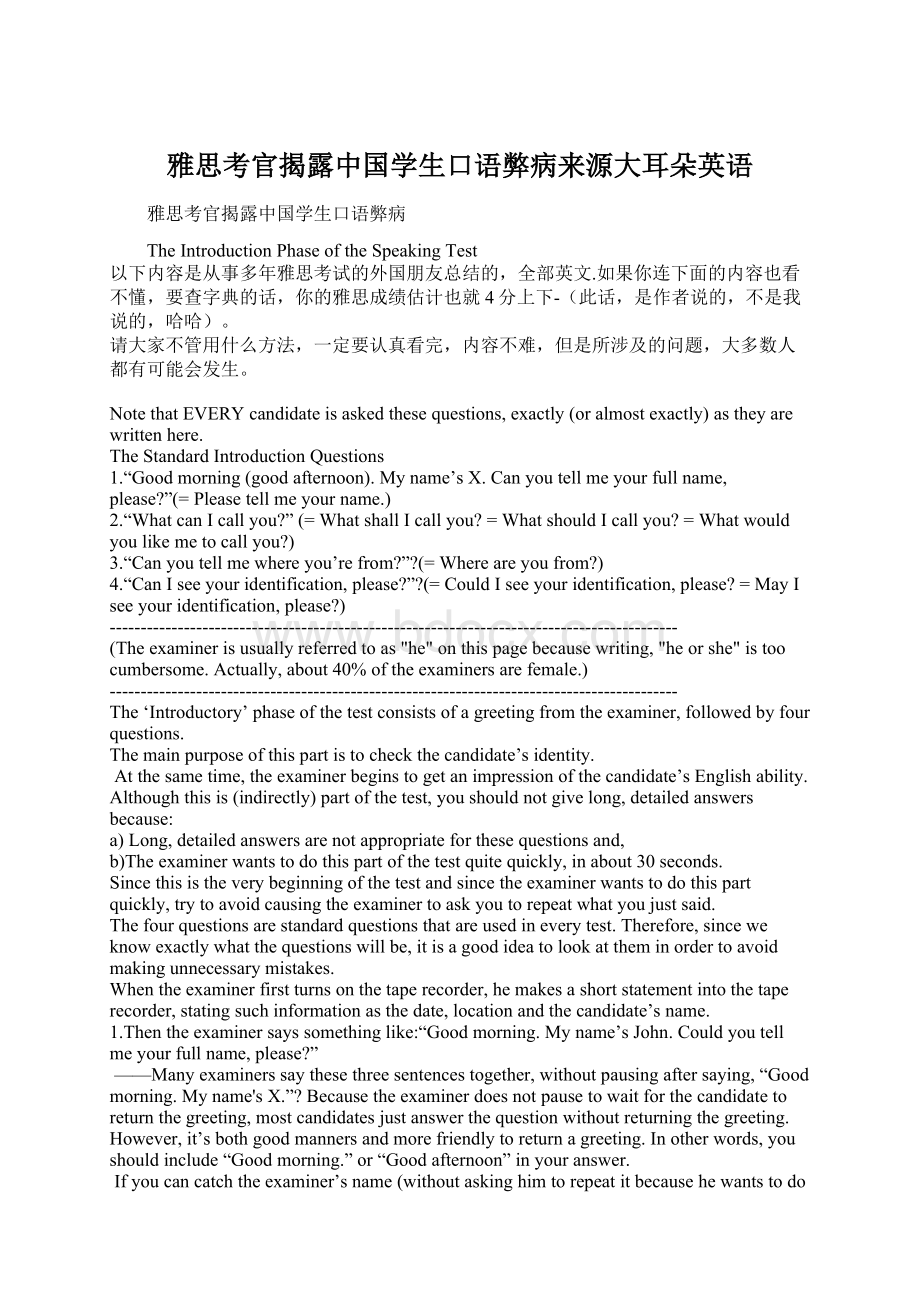雅思考官揭露中国学生口语弊病来源大耳朵英语.docx
《雅思考官揭露中国学生口语弊病来源大耳朵英语.docx》由会员分享,可在线阅读,更多相关《雅思考官揭露中国学生口语弊病来源大耳朵英语.docx(7页珍藏版)》请在冰豆网上搜索。

雅思考官揭露中国学生口语弊病来源大耳朵英语
雅思考官揭露中国学生口语弊病
TheIntroductionPhaseoftheSpeakingTest
以下内容是从事多年雅思考试的外国朋友总结的,全部英文.如果你连下面的内容也看不懂,要查字典的话,你的雅思成绩估计也就4分上下-(此话,是作者说的,不是我说的,哈哈)。
请大家不管用什么方法,一定要认真看完,内容不难,但是所涉及的问题,大多数人都有可能会发生。
NotethatEVERYcandidateisaskedthesequestions,exactly(oralmostexactly)astheyarewrittenhere.
TheStandardIntroductionQuestions
1.“Goodmorning(goodafternoon).Myname’sX.Canyoutellmeyourfullname,please?
”(=Pleasetellmeyourname.)
2.“WhatcanIcallyou?
”(=WhatshallIcallyou?
=WhatshouldIcallyou?
=Whatwouldyoulikemetocallyou?
)
3.“Canyoutellmewhereyou’refrom?
”?
(=Whereareyoufrom?
)
4.“CanIseeyouridentification,please?
”?
(=CouldIseeyouridentification,please?
=MayIseeyouridentification,please?
)
--------------------------------------------------------------------------------------------
(Theexaminerisusuallyreferredtoas"he"onthispagebecausewriting,"heorshe"istoocumbersome.Actually,about40%oftheexaminersarefemale.)
--------------------------------------------------------------------------------------------
The‘Introductory’phaseofthetestconsistsofagreetingfromtheexaminer,followedbyfourquestions.
Themainpurposeofthispartistocheckthecandidate’sidentity.
Atthesametime,theexaminerbeginstogetanimpressionofthecandidate’sEnglishability.
Althoughthisis(indirectly)partofthetest,youshouldnotgivelong,detailedanswersbecause:
a)Long,detailedanswersarenotappropriateforthesequestionsand,
b)Theexaminerwantstodothispartofthetestquitequickly,inabout30seconds.
Sincethisistheverybeginningofthetestandsincetheexaminerwantstodothispartquickly,trytoavoidcausingtheexaminertoaskyoutorepeatwhatyoujustsaid.
Thefourquestionsarestandardquestionsthatareusedineverytest.Therefore,sinceweknowexactlywhatthequestionswillbe,itisagoodideatolookattheminordertoavoidmakingunnecessarymistakes.
Whentheexaminerfirstturnsonthetaperecorder,hemakesashortstatementintothetaperecorder,statingsuchinformationasthedate,locationandthecandidate’sname.
1.Thentheexaminersayssomethinglike:
“Goodmorning.Myname’sJohn.Couldyoutellmeyourfullname,please?
”
——Manyexaminerssaythesethreesentencestogether,withoutpausingaftersaying,“Goodmorning.Myname'sX.”?
Becausetheexaminerdoesnotpausetowaitforthecandidatetoreturnthegreeting,mostcandidatesjustanswerthequestionwithoutreturningthegreeting.However,it’sbothgoodmannersandmorefriendlytoreturnagreeting.Inotherwords,youshouldinclude“Goodmorning.”or“Goodafternoon”inyouranswer.
Ifyoucancatchtheexaminer’sname(withoutaskinghimtorepeatitbecausehewantstodothissectionquitefast)thenyoushouldalsoincludehisorhernameinyouranswer.
——Don'tsay,?
“Goodmorning,Mr.John.”ThewordsMr.,Miss,Mrs.andMs.areonlyusedbeforeaperson'ssurnameand“John”isnot(usually)asurname.Theexaminerusuallyjustsayshisorhergivenname(firstname),nottheirfullname.
——Asuitablereplyis:
“Goodmorning,John.MynameisWangJianfeng.”Ifyoudonotincludehisname,itdoesn’tmattertoomuchbutrememberthattheexaminerisahumanbeingandhearingyousayhisnamewouldbeapleasantsurpriseforhim!
Hewillthinkofyou,“Whataniceperson!
”
——Throughoutthespeakingtest,itisbesttousethecontractedformsofEnglishwheneverpossiblebutinthisfirstanswer,itisperfectlyappropriatetosay,“Mynameis”ratherthan,“Myname’s”.ItisappropriateherebecausewhenapersonstateshisorhernameinasituationsuchastheIELTSinterview,theyusuallywanttosayitveryclearlysothatthelistenermakesnomistakewiththename.Don'tforget,theexaminerisverifyingyouridentityhere.
——It’soktosay,“Goodmorning,John.MyfullnameisWangJianfeng.”butit’snotreallynecessarytorepeattheword,“full”.However,youdefinitelymustsayyourcompletename–don’tjustsay,“Myname’sWang.”
——EventhoughyouarespeakingaChinesename,youstillshouldspeakitclearlyfortheforeigner.Infact,youshouldspeakitmoreclearlythanyouwouldifyouwerespeakingtoaChineseperson.Thisisbecauseitisimportantfortheexaminertoconfirmthatitreallyisyousittingthereandnotyourbrotherorsomeoneelse.Theexaminerhasyourapplicationforminfrontofhimandyournameiswrittenonitinhanyupinyin.Remember,theexaminerdoesnotwanttowastetimebyaskingyoutorepeatyournamebecausehedidn’thearitclearly.
——Don’tchangetheorderofyournameandsayyournameis,“JianfengWang”.(Evenifyoudothetestoverseas,respectyourChinesenamingsystem.)
Besides,yournamewillbewrittenas,"WangJianfeng"ontheapplicationform,whichiswhattheexaminerislookingatasyousayyourname.
——Don’tsay,“MyChinesenameis_____”.Itiscompletelyunnecessarytosaytheword,“Chinese”becausethepurposehereistocheckyourlegalidentity,thatis,yourrealname;youonlyhaveonelegalnameandthatisyourChinesename.Thewordingofthequestion,“...yourfullname...”showsthatthisisaseriousquestionandthattheexaminerwantsyoutosayyourrealname.YourEnglishname,ifyouhaveone,isnomoresignificantthananickname;youcanchangeitatanytime.
——Don’tspellyourname.?
(Onlyspellitiftheexaminercan'tunderstandyourpronunciationofit.)
——Don’tsay,“WangismyfamilynameandJianfengismygivenname.”Thequestiondidn’taskyoutoexplainyourname.SometimesthereisaPart1topicconcerning‘Names’andinsuchatopic,explainingyournamecouldbesuitable.Butnothere.SayingthatalsogivestheexaminerthefeelingthatyouranswercomesfromanIELTSbook.Youshouldavoidcausingtheexaminertothinkthisbecauseexaminersverymuchpreferoriginalanswersfromyou.TheonlytimewhenitmightbeappropriatetoexplainwhichisyoursurnameandwhichisyourgivennameisifyouareaChinesepersondoingtheIELTStestoverseas.
——Don’tcalltheexaminer,“Sir”,“Miss”or“Madame”.Ifyoudidn’thearhisorhername,justsay,“Goodmorning.”withoutsayinghisorhername.Using“Sir”,“Miss”or“Madame”isasignthatyoueitherconsidertheexaminertobeateacherorthatyouarebeingunnecessarilyformalorthatyouconsidertheexaminertobeyour‘superior’–youshouldthinkoftheexaminerasanequal,notassomeonesuperiortoyou.Ifyouthinkoftheexaminerasanequal,youwillspeakmoreopenly,bemorerelaxedandgetabetterscorethanifyouthinkheorsheisasuperior,orsomekindof‘examininggod’.Remember,WesternersareusuallylessformalthanChinesepeople.
——Theexaminer’squestionwas,“Couldyoutellmeyourfullname,please?
”andthissoundslikea“Yes/No”question.However,thisformofquestionisnotreallya“Yes/No”question;it’sanindirectquestion,whichreallymeans,“Whatisyourfullname?
”Indirectquestionsareconsideredmorepolitethandirectquestions.
——Wheneveryouareaskedsuchanindirectquestion,youshouldnotanswerwith,“Yes”or,“Yes,Icould.”NativeEnglishspeakerssometimesdoanswersuchquestionsbyfirstsayingaveryquick,“Yes”butyoushouldnotsaythatbecausetheexaminermightthinkthatyouthinkitreallyisa“Yes/No”question.
——Somecandidatesgiveananswersuchasthis:
“MynameisWangJianfengbutyoucancallmeRobert.”Thisanswerisquiteacceptableandquitenaturalinanon-testsituation,forexample,ifyoumeetaforeigneronthebus.ButIsuggestyoudon'tsaythatintheIELTSSpeakingtestbecausesomeexaminersmightthinkthatyoualreadyknewwhatthesecondquestionis(“WhatcanIcallyou?
”)andthatyouhadrehearsedyouranswerandexaminersdon’tlikeanswersthatseemtobeobviouslyrehearsed.
Notonlythat,addingthewords,“...butyoucancallme...”inasituationwheresomeoneisverifyingyouridentityisalittleunsuitable.Ifapolicemanorabankclerkaskedyou,“Canyoutellmeyourfullname,please?
”wouldyouanswerwith,“MynameisWangJianfengbutyoucancallmeRobert”
——Inotherwords,Iwouldsayitisbetternottoadd,“...butyoucancallme...”afterthisquestion.Instead,waitfortheexaminer'ssecondquestion.
2.Thentheexaminerwillsay:
“WhatcanIcallyou?
”(Or,“WhatshallIcallyou?
”)
Withthisquestion,theexaminerisindicatingthatheorshewouldliketoaddressyouinthetestwithsomenamethatisshorterand?
friendlier?
thanyourfullname.Thisisasignthatthetestwillnotbeveryformalandseriousbutwillinstead,tosomeextent,havesomeofthefeaturesofafriendlychat.
However,asImentionedabove,itisbettertowaitfortheexaminertoindicatethis,withthissecondquestion,thanforyoutomakethedecisionontheformalitylevelofthetestbysaying,"...butyoucancallme....".Lettheexaminerbeinchargeofthetest.
——Youdon’tneedtouseanEnglishname!
ButifyoudouseanEnglishname,makesurethatitissimpleandeasyfortheexaminertounderstandthefirsttimeyousayit.It’sprobablybesttouseafairlycommonlyusedname.Forexample,noEnglishspeakerchoosestobecalled,“Apple”,evenasanickname.Thiskindofnamecouldcausetheexaminertoaskyoutorepeatyournamebecausehemightnotbesurehehearditcorrectly.
——IfyoudochoosetosayanEnglishname,makesurethatyoucanpronounceitcorrectly!
MispronouncingyourownEnglish(nick)nameisanunnecessarymistakeandwouldnotgivetheexamineraverygoodimpression.Forexample,ifyourEnglishnameisHarry,don’tsay,“JustcallmeHairy.”(Seehereforthemeaningof"hairy".)Or,ifyourEnglish